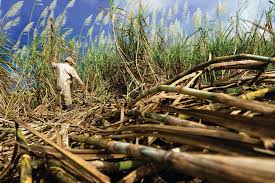Mauritius, an island nation in the Indian Ocean over 700 miles from the coast of Madagascar, is working to get rid of fossil fuels by replacing them with sugar.
毛里求斯是印度洋上的一个岛国,距离马达加斯加海岸700多英里,该国正在努力用糖取代化石燃料。
The island has historically relied on imported petroleum as fuel but is finding that their main cash-crop is providing a reliable, more economical option.
这个岛国一直依赖进口石油作为燃料,但现在他们发现,其主要经济作物提供了一种可靠、更经济的选择。
Once a sugar cane stalk has been squeezed of all the juice used in sugar production, a pile of dry, pulpy sticks and stalks remain.
当甘蔗茎杆榨干用于制糖的所有汁液后,就会剩下一堆干烂的茎渣。
These leftovers -- known as bagasse -- are then burned to generate power, and already accounts for 14 percent of the island's energy needs.
这些被称为甘蔗渣的剩余物,在燃烧后用来发电,提供了该岛国14%的能源需求。
After factoring in the area's solar, wind and hydro capabilities, nearly a quarter of Mauritius' daily consumption are provided by renewable resources
考虑到该地区的太阳能、风能和水力发电能力后,毛里求斯近四分之一的日常能耗由可再生资源提供。
And the government hopes that 35 percent of the island will run on renewable sources by 2025.
该国政府希望到2025年,岛上35%的地方将使用可再生能源。

"The 35 percent is not far off. We will have 11 solar parks by next year and at least two wind farms," Ivan Collendavello, Mauritius' deputy prime minister, told the Agence France-Press (AFP).
毛里求斯副总理伊万·科伦达韦洛向法新社透露:“35%的目标已经不远了。到明年,我们将拥有11个太阳能发电区,以及至少两个风力发电厂。”
But sugar, the nation's main cash crop, is expected to continue leading the charge towards a more environmentally friendly future.
但是作为这个国家主要经济作物的糖,预计将继续引领电能源朝着更加环保的未来前进。
Currently, four of the island's sugar companies run their own thermal power station -- together generating up to 60 percent of the island's electricity.
目前,岛上四家糖业公司经营着他们自己的热电站,一起供应岛上60%的电力。
At each plant, the bagasse stalks are fed into the thermal stations, where they burn up at 932 degrees Fahrenheit and are used to fuel both the plants themselves as well as the national grid.
每个糖厂的的甘蔗渣秆被送入热电站,在那里它们在华氏932度下燃烧,为电厂和国家电网提供燃料。
"Electricity is available 24 hours a day, on demand, without having to wait for the wind or the sun," Jacques D'Unienville, a manager at Omincane, one of Mauritius' sugar companies, told AFP. "Since we can store bagasse as we would oil and coal."
毛里求斯奥米坎糖业公司的经理雅克·德·尤宁维尔向法新社透露:“每天24小时随时供电,无需等待风或太阳。因为我们可以像储存石油和煤炭那样储存甘蔗渣。”












